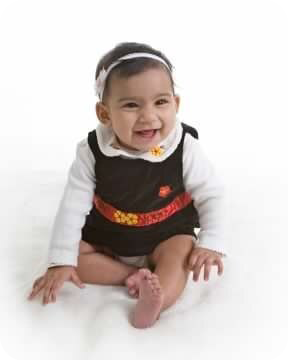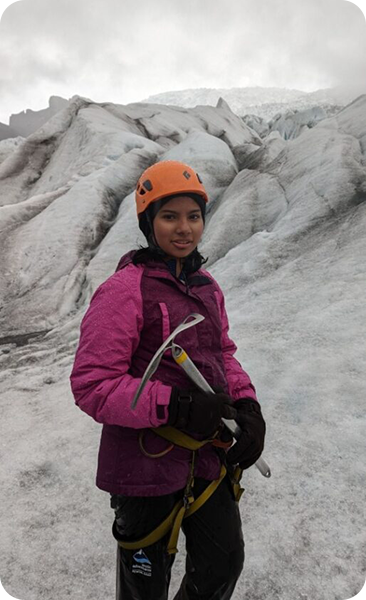“Thalassemia is part of who I am. It’s not a defining characteristic, but like most other people with this condition, it is my normal,” said 17-year-old Eashani. Reflecting on her unique childhood, Eashani emphasized the importance of self-advocacy and self-assurance for teenagers and kids navigating thalassemia. Eashani feels fortunate to receive medical care at Phoenix Children’s, where the staff has taught her many of these lessons since she was five.
Eashani's path has also been guided by her mother, Swati, who discovered her daughter's thalassemia diagnosis during a newborn screening many years ago, prompting a journey into the unknown for their family.
Thalassemia is a genetic blood disorder affecting hemoglobin production, causing anemia and fatigue due to reduced hemoglobin levels. Ongoing medical care throughout life, including frequent blood transfusions, is often necessary to maintain healthy hemoglobin levels.
Fortunately for Eashani and her family, Phoenix Children’s provides care and services both to treat pediatric thalassemia and to address any educational, developmental or emotional issues that might arise as a result of the condition or treatment.
Integrating thalassemia care into her life
Eashani, now a high school junior, has been under the care of Sanjay Shah, MD, Angela Giannotti, BSN, MS, FNP-C and the hematology & oncology team at Phoenix Children’s since 2011. With their guidance and the support of advocacy groups, Eashani has developed a remarkable sense of emotional maturity and inner strength.
Eashani is living with beta thalassemia major, a form of thalassemia that requires blood transfusions every three weeks. This condition can lead to severe physical exhaustion, muscle ache, joint pain and other challenges. Dr. Shah has been the guiding force behind Eashani at Phoenix Children’s for the past 12 years. “Eashani's determination to stay positive throughout the process is truly remarkable,” said Dr. Shah. “She exemplifies an attitude of resilience we hope to see in all our patients – and really in any child.”
Eashani's treatment regimen involves recurring transfusions to replenish her red blood cells, along with iron chelator administration to counter iron buildup from transfusions. Although she's experienced with integrating these hours-long blood transfusions into her life, this routine presents challenges such as missed school days, rescheduled tests and the continuous need to advocate for herself.
Like many other pediatric patients managing chronic blood disorders, Eashani often finds herself asking for deadline extensions, taking tests by herself after school or having a much more challenging extracurricular schedule. These schedule adjustments often lead to questions and comments from her peers, underscoring the importance of helping children develop self-assured, resilient demeanors.
Swati shared, “If you interacted with my daughter, you would never know she has this condition. We had to be her advocate when she was little, then teach her how to advocate for herself as she grew older. She does an amazing job at speaking up and ensuring she gets every opportunity she deserves.”

Finding a community of support
Within Phoenix Children's, Eashani and her family found a supportive community that fostered both physical comfort and emotional strength. “I am really lucky to be cared for by this team,” said Eashani. “I have always felt supported and never felt like a burden, even on my bad days. Their approach has inspired me to have an even more positive outlook on life.”
In addition, the Phoenix Children's multidisciplinary care approach has streamlined the family’s thalassemia care plan, coordinating essential treatments and annual check-ups for endocrinology, heart, liver and other essential aspects in one location. This centralized care ensures effective collaboration among specialists and maintains a cohesive health record for Eashani.
“This holistic approach speaks volumes about Phoenix Children’s dedication to providing the best possible care,” said Swati. “It reaffirms our family's confidence in the outstanding services we receive.”
Eashani and Swati also have found a community of support through the Cooley’s Anemia Foundation, a large support network that fosters interaction between families learning to live with thalassemia. Meeting adults in their 60s thriving with thalassemia and connecting with fellow teenagers with thalassemia has helped Eashani to feel liberated. The foundation initially referred the family to Dr. Shah upon their relocation to Phoenix.
“Interacting with other kids who understood what I was going through was incredibly reassuring and validating,” said Eashani.
Eashani describes how Thalassemia is often an “invisible illness,” and being able to connect with people who truly grasped her experiences lifted a burden she didn't even know she was carrying.

Today, Eashani is on the path to graduate from high school with honors and plans to study medicine in college – with the intention of specializing in hematology. “The world doesn’t stop for me or for any other child diagnosed with thalassemia,” Eashani added. “Thanks to Phoenix Children’s, I know how to manage my life and have the same opportunity to succeed as any other person would. I feel very excited about the future.”
Phoenix Children’s Center for Cancer & Blood Disorders (CCBD) provides comprehensive and compassionate care to children facing hematologic and oncologic conditions. It is the largest pediatric program of its kind in Arizona, providing complete care for children diagnosed with malignancies and blood diseases. Using a family-centered approach, CCBD provides comprehensive, personalized care to every hematology and oncology patient.
For more information about Phoenix Children’s Center for Cancer & Blood Disorders and the transformative care we offer, click here.

